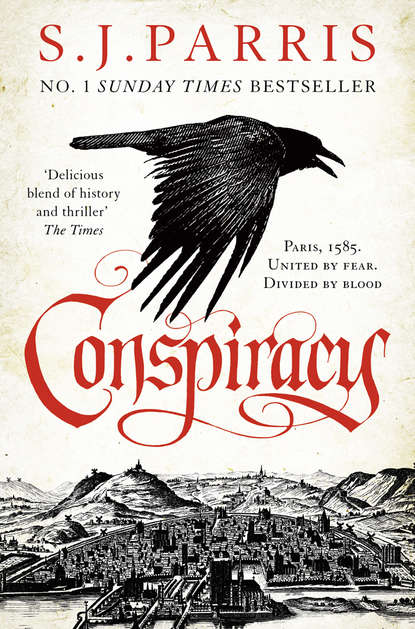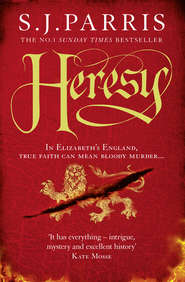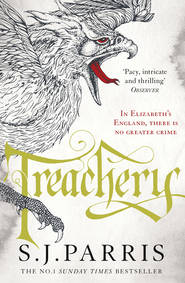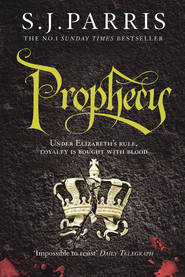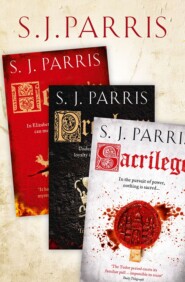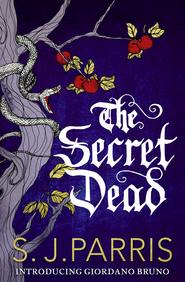По всем вопросам обращайтесь на: info@litportal.ru
(©) 2003-2024.
✖
Conspiracy
Автор
Год написания книги
2019
Настройки чтения
Размер шрифта
Высота строк
Поля
‘Writing another heretical book?’
‘That would depend on who is reading it.’
‘Ha. Good luck finding a printer. As I say – you will find Paris greatly changed.’ He lifted the latch; the door swung open with a soft complaint. ‘And – Bruno?’
‘Yes?’
‘I know it does not come naturally to you, but try a little humility. You may have enjoyed the King’s favour once, but that means nothing now. I wouldn’t go about proclaiming your sins with such relish, if I were you.’
‘Oh, I only do that in the sanctity of the confessional. Father.’
‘And you only do that once in nine years, apparently.’
His laughter grew faint as he walked away, though whether it was indulgent or scornful was hard to tell. I sat alone in the closeted shadows until the tap of his heels on the flagstones had faded completely, before stepping into the chilly hush of Saint-Séverin.
I did not know then that this would be the last time I spoke to Père Paul Lefèvre. Within a week of our meeting, he had been murdered.
PART ONE (#ua64309e4-61c3-5734-9347-6c90532311a5)
ONE (#ua64309e4-61c3-5734-9347-6c90532311a5)
They found him face down in the Seine at dusk on November 26th, two bargemen on their way home after the day’s markets. The currents had washed him into the shallows of the small channel that ran south from the shore of the Left Bank along the line of the city wall, close to the Abbey of Saint-Victor; near enough that, being outside the wall and since he was wearing a black cassock that billowed around him in the murky water, the boatmen turned first to the friars, thinking he was one of theirs. It was only when they hauled him out of the river that they realised he was not quite dead, despite the gaping wound on his temple and the blood that covered his face.
I was reading in my usual alcove in the library that evening, a Tuesday, two days after Paul preached the sermon he had promised all Paris would remember, when a young friar flung open the door and cast his eyes about the room in a state of agitation. I watched him exchange a few urgent words in a low voice with Cotin, the librarian. They were both looking at me as they spoke; Cotin’s jaw was set tight, his eyes apprehensive. My presence in the library was not entirely official.
‘You are Bruno?’ The young man strode down the aisle between the bookcases, his face flushed. When I nodded, half-rising, he turned sharply, beckoning me to follow. ‘You must come with me.’
I obeyed. I was their guest; how could I refuse? He led me at a brisk trot across the main cloister, his habit flapping around his legs. Though it was not much past four in the afternoon, the lamps had already been lit in the recesses of the arcades; moths panicked around them and the passages retreated into shadow between the pools of light. I followed the boy through an archway and across another courtyard, wondering at the nature of this summons. I had done nothing to attract unwelcome attention since I arrived in Paris two months ago, or so I believed; I had barely seen any of my previous acquaintance, save Jacopo Corbinelli, keeper of the King’s library. At the thought of him my heart lifted briefly: perhaps this was the long-awaited message from King Henri? But the young man’s evident anxiety hardly seemed to herald the arrival of a royal messenger. Wherever he was taking me with such haste, it did not imply good news.
At the infirmary block, he ushered me up a narrow stair and into a long room with a steeply sloping timber-beamed ceiling. The air was hazy with the smoke of herbal fumigations smouldering in the corners to purify the room – a bitter, vegetable smell that took me back to my own days as a young friar assisting in the infirmary of San Domenico Maggiore in Naples. It did not succeed in disguising the ferric reek of blood, or the brackish sewage stench of the river.
Two men in the black habits of the Augustinians flanked a bed where a shape lay, unmoving. Water dripped from the sheets on to the wooden boards in a steady rhythm, like the ticking of a clock. One, grey-bearded and wearing a leather apron with his sleeves rolled, leaned over the bed with a wad of cloth and a bowl of steaming water; the other, dark-haired, a crucifix around his neck, was performing the Anointing of the Sick in a strident voice.
The bearded friar, whom I guessed to be the brother infirmarian, raised his eyes as we entered, glancing from me to the young messenger and back.
‘Is this the man?’ Before I could reply, he gestured to the bed. ‘He has been asking for you. They brought him here no more than a half-hour past – your name is the only word he has spoken. To tell the truth, it is a miracle he can form speech at all. He is barely clinging to this world.’
The other friar broke off from his rites to look at me. ‘One of the brothers thought he remembered an Italian called Bruno who came to use the library.’ His voice was coldly polite, but his expression made clear that he was not pleased by the interruption. ‘Do you know this poor wretch, then?’ He stepped back so that I could see the prone figure. I could not stop myself crying out at the sight.
‘Gesù Cristo! Paul?’ But it seemed impossible that he could hear me. His eyes were closed, though his right was so swollen and bloodied that he could not have opened it, even if he had been conscious. Above his temple, his skull had been half-staved in by a heavy blow – a stone, perhaps, or a club. It was a wonder the force had not killed him outright. The infirmarian had attempted to clean the worst of it, but the priest’s skin was greenish, the right side of his head thickly matted with blood drying to black around the soaked cloth they had pressed over the wound. Beneath it, I saw a white gleam of bone.
‘His name is Paul Lefèvre.’ I heard the tremor in my voice. ‘He’s the curé at Saint-Séverin.’
‘Thought I knew his face.’ The one with the dark hair and the crucifix nodded at his colleague, as if he had won a private wager. ‘I’ve heard him preach. Bit fire and brimstone, isn’t he? One of those priests that’s bought and paid for by the League.’
From the corner of my eye I caught the infirmarian sending him a quick glance, a minute shake of the head that I was not supposed to see. I understood; it was unwise to express political opinions in front of strangers these days. You never knew where your words might be repeated.
‘Can anything be done for him?’ I asked.
The infirmarian pressed his lips together and lowered his eyes. ‘I fear not. Except to send his soul more peacefully to Our Lord. Frère Albaric was already giving the sacrament. But if it is any comfort, I do not think he feels pain, at this stage. I gave him a draught to ease it.’
‘Did anyone see anything? Whoever found him – do they know who did this?’
The dark-haired friar named Albaric made a small noise that might have been laughter. ‘I don’t think you need look much further than the Louvre Palace.’
I stared at him. ‘No. The King …’ I was going to say the King would not have a priest killed just because that priest insulted him from the pulpit, but the words dried in my mouth. I had not seen the King for three years; who knew what he might be capable of, in his present troubles? And even if the King lacked the temperament to strike at an enemy from behind, his mother certainly did not. I wondered what Paul had been doing in this part of town; had he been on his way to see me when he was ambushed? A worrying thought occurred.
‘Did he have any letters on him?’
‘Why do you ask?’ Frère Albaric jerked his head up, his voice unexpectedly sharp.
‘I only wondered if he was carrying anything that might suggest why he was attacked. Papers, valuables, that sort of thing.’ I kept my tone mild, but he continued to fix me with the same aggressive stare. His skin had an unpleasant sheen, as if his face were damp with sweat; it gave him a disturbingly amphibious quality.
‘He had nothing about his person when he was brought here,’ the infirmarian said. ‘Just the clothes he was wearing.’
‘Robbed, one presumes,’ Albaric declared. ‘All kinds of lawless types you get, loitering outside the city walls. Waiting for traders coming home with the day’s takings. They’d have stripped him of anything worth having before dumping him in the river, poor fellow.’
‘But he’s obviously a priest, not a trader,’ I objected. ‘Street robbers would hardly expect a priest to carry a full purse.’
Albaric’s eyes narrowed. ‘He might have been carrying alms to give out. Or perhaps he was wearing a particularly lavish crucifix. Some of them do.’
I glanced at his chest; his own ornament was hardly austere. ‘Not Paul. He dislikes ostentation.’ Unless he had changed in that regard too, since joining the Catholic League, but somehow I doubted it, just as I found it hard to believe that he had fallen to some chance street robbery on his way to the abbey. Whoever struck him down had done so with a purpose, I was sure.
‘Huguenots, then. Wouldn’t be the first cleric they’ve assaulted. They’ll take any opportunity to attack the true faith.’ Albaric sniffed and turned back to his vial of chrism, as if the matter was now closed. I did not bother to argue. In case of doubt, blame the Protestants: the Church’s answer to everything. Though I could not help but notice that this Albaric seemed eager to point the finger in all directions at once.
I drew closer to the bed and leaned as near as I could to the dying man’s lips, but found no trace of breath.
‘Paul. It’s Bruno.’ I laid a hand over one of his and almost recoiled; the skin was cold and damp as a filleted fish. ‘I’m here now.’
‘He can’t hear you,’ Albaric pointed out, over my shoulder. Ignoring him, I bent my cheek closer. I remained there for several minutes, listening, willing him to breathe, or speak, to give some sign of life, while the friar shifted from foot to foot behind me, impatient to resume his office. Eventually, I had to concede defeat. I had been in the presence of death often enough to know its particular stillness, its invidious smell. Whatever Paul had wanted to tell me, I had missed it. I straightened my back, head still bowed, and as I did so, I felt the cold fingers under mine twitch almost imperceptibly. Albaric was already moving in with his chrism; I held up a hand to warn him off. Under Paul’s one visible eyelid, the faintest flicker. His fingers closed around my thumb; his chest rose a fraction as he scraped a painful breath, his frame twisting with the effort. His left eye snapped open in a wild gaze that seemed both to fix on me and look straight through me, into the next world. I gripped his hand tight; he gave a violent shiver and exhaled with his death rattle one final, grating word:
‘Circe.’
TWO (#ua64309e4-61c3-5734-9347-6c90532311a5)
I hurried back towards the Porte Saint-Victor through a veil of fine rain as dusk fell, keen to disappear into the warren of narrow streets around the colleges on the Left Bank before anyone noticed I had gone. In the commotion after Paul’s death I had slipped away from the abbey, knowing they would call in the city authorities; life may be cheap in Paris in these turbulent times, but the murder of a priest was still a serious matter, particularly one with Paul’s connections, and I did not want to find myself caught up in their investigation. The friars had asked me, of course, what his urgent last word had been; I told them ‘Jesus’. I don’t know if they believed me. I was not sure what instinct prompted me to lie; only that it seemed prudent not to divulge anything to people I did not know, especially those in holy orders. Paris was so fractured by divided loyalties that the wrong word to the wrong person could ripple outwards with unintended consequences, and my position was too precarious to place myself knowingly at the heart of a political murder – for it seemed to me that Albaric’s first surmise had been correct, that the attack was a direct result of Paul’s eloquent rant against the decadence and corruption of the royal House of Valois from his pulpit the previous Sunday.
‘Circe’, I supposed, must be some kind of code word, intelligible perhaps to his confederates in the Catholic League, but I had no idea what it might mean, or what might be unleashed by repeating it in the wrong ear. Could it be connected to the identity of his killer? Was that what he was trying to tell me? I was not convinced that Paul had even been aware of who I was at the end. Best to keep silent until I could seek the advice of Jacopo Corbinelli, the only man in Paris I dared to trust. Like me, Jacopo was a scholar, an Italian in exile, part of the Florentine entourage that surrounded Catherine de Medici, the widowed Queen Mother. He had been King Henri’s boyhood tutor and continued to serve him as advisor and keeper of his library, though he also remained Catherine’s secretary, and as such he was uniquely placed to speak in my favour at court. He had taken me under his wing when I arrived in Paris for the first time, four years ago; it was he who had heard me give a lecture on my art of memory at the University and recommended me to the King. I became a regular guest among the Italian thinkers, writers and artists who gathered around Jacopo’s supper table in those days and I had hoped, on returning from London, that I might renew the friendship and enjoy again the warmth of that company. But affairs of state kept him busy now between the palaces, or so he told me; I had seen him only twice since I arrived at the beginning of September, and though he had assured me he would persuade the King to grant me an audience, I was still waiting for a word, and it was now almost a month since I had heard anything from him. I decided to send another message to his house and ask to see him urgently. Until then, I would keep my mouth shut regarding Paul’s murder; too much about it made me uneasy.
On impulse, I turned north towards the river before I reached the gate, in the direction of the old fort of La Tournelle which stood a squat sentinel over the Seine and its islands, marking the boundary of the city wall. Here, Paris ended abruptly, bustling streets giving way to ploughed fields and orchards, wide unpaved roads built for ox-carts and canals for goods barges from the surrounding farms – all the arteries that kept money flowing in and out of the city. Huddled in the shadow of the old wall, the Faubourg Saint-Victor offered little to passing visitors besides the great abbey that gave the district its name; only a few scattered cottages and cheap inns along the main road out of the city. Mudbanks sloped down to the river, pockmarked with the tracks of gulls; rickety wooden jetties splayed into the water at intervals, their boards slick with weed and splintered like rotten teeth. I walked slowly back along the bank where the inland channel met the broad expanse of the river, scanning the ground to either side. With that head wound, Paul would not have survived more than a few minutes in the water. The current must have washed him into the shallows of the inlet and on to the bank almost as soon as he was thrown in or he would have drowned, which meant he must have been struck just upriver from the channel – in other words, right under the wall of the abbey. It was hard to imagine that Paul would have had any other destination in this part of town; it was reasonable to assume, too, given that he had asked for me by name on his deathbed, that he had come to the abbey looking for me. But someone else had encountered him first.
A wooden bridge crossed the channel, leading directly to the narrow track that passed along the bank at the back wall of the abbey grounds. A few yards further along I found what I was looking for: a patch of churned-up mud, the dark blotch of bloodstains almost invisible now in the fading light against the wet ground. If the rain continued, they would be gone by morning. A chaos of footprints led away from the scene in all directions; though I could see an imprint that might have indicated where a body was dragged to the water’s edge, it was impossible to see where the tracks led after that. Even so, this scene undermined Albaric’s other theory of street robbers; the route for traders passed in front of the abbey’s main gates. No bandit who knew his business would bother lurking on this isolated path in the hope of grabbing a farmer with a fat purse.
I turned slowly, surveying both sides of the river. Only yards from the trampled spot where Paul must have been attacked I noticed a low door set into the boundary wall of the abbey; below it, a set of stone steps leading down to the water, with a rusted iron ring for tethering a boat. I tried the handle of the door but it was locked fast. There was no other living soul stirring out here in the gathering dusk, save a heron flapping its stately line across the row of clouds; at my back the river flowed on, grey and implacable, while beyond the wall, the grand spire of the abbey church and a few plumes of smoke from the cottages stood out against the darkening sky. A lonely place, but in daylight there would be enough traffic on the river to mean that anyone standing here would be visible to passing boatmen. The killer had taken a risk; Paul’s death had been a matter of urgency, then. Had his attacker followed him from his lodgings, watching for an opportunity once he realised his target was leaving the city? Or was he already waiting, knowing that Paul would come to the abbey this afternoon?
A staccato exchange between oarsmen out on the river drifted across on the breeze. I turned and watched as two pinpoints of light wavered towards one another, accompanied by the slow splashing of oars. A gust of laughter rippled out as the wherries passed. The boatmen who found Paul must have missed the killer by a matter of minutes; perhaps their arrival had caused him to take flight before the job was finished. It would not be impossible to track down those men and question them, though I supposed that if they had had anything to tell, they would have mentioned it to the friars. It was also likely that they had gone through the injured man’s clothes in search of valuables before they realised he was still breathing; life was hard for everyone now in Paris, and even honest men were desperate. If they had found anything worth taking, they would not want to answer questions. I could not help thinking – and it was not a thought which did me credit – that if they had only arrived a few minutes later, he would not have been alive to say my name, and I would not have been the one to hear him rasp out his gnomic last word. My life in Paris was dangerous enough without involving myself in a factional murder and I had an uneasy sense that, with his dying breath, Paul had handed me a thread that would, at the slightest tweak, unravel a mystery better left untouched.
I glanced back at the wall as a new thought occurred; anyone with a key to that door could easily attack a man, push him in the water and disappear again inside the abbey in a matter of minutes. I kicked over the dark stains in the mud and turned towards home.





